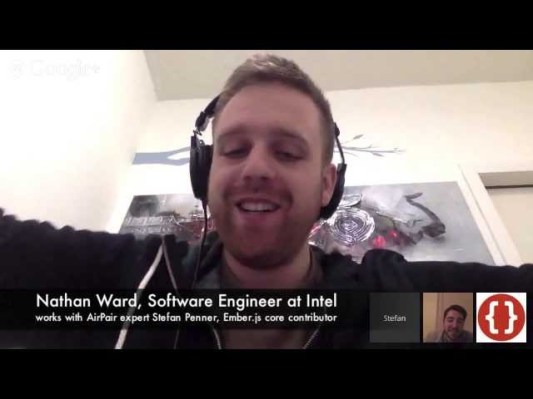Learning the fundamentals of programming is easy. But becoming an expert? That’s damn hard. There are a million and one languages, each with their own nuances, strengths, and weaknesses. Worse yet, the programming hype train is always chugging away; just when you think you’ve mastered the world’s greatest language, everyone will be talking up some new language or framework or database and your boss’ boss will be asking why you’re not using that, instead.
AirPair connects you with expert programmers, on-demand.
We first wrote about AirPair back in March of last year. Back then, it was just a one-man shop with an interesting idea. It seemed like something that should work, but it was a bit too early to tell. They’d done just seven on-demand calls, and had but a handful of experts to call in. Their service was, at its core, a Google Docs form.
11 months later, the idea seems to be working out. The one-man team has grown to five, and found their way into Y-Combinator’s most recent class. That handful of experts has grown into the thousands. They’ve ditched the Google Doc form, building up a proper site and service around the idea. Companies like Intel are turning to them to figure how which frameworks to adopt internally. While they kept their actual numbers under wraps, the company tells me that they reached “ramen profitable” levels shortly after launch, and have been growing their revenue 40% month-over-month ever since.
So how does it work?
If you’re familiar with Google Helpouts, the idea here is quite similar — just far more focused on a specific topic (and, to be fair to them, AirPair launched months before we broke the news of Helpouts’ existence).
First, you tell AirPair what sort of expert you’re looking for. Need help with an Android app? Trying to determine which Javascript framework would be best suited for your new web app before you start digging into one? (For the curious, I asked AirPair where they’re seeing the most demand. In no particular order: Angular.JS, Ember.JS, and of course iOS/Android)
From there, you tell AirPair how much you’re willing to pay per hour, with each tier opening up access to a wider pool of experts. $60 an hour, for example, gets you access to around 15% of the site’s experts — the folks who can answer most basic coding questions. $90 an hour opens it up to people who’ve been coding for a few years, and can tell help you start to crack the tougher issues. It goes all the way up to $300 an hour, at which point you’re talking to people who more or less live in code; the people who (literally) wrote the book on this stuff. (Each engineer on the service picks their own rate, with AirPair gauging customer success/satisfaction to ensure that everyone finds themselves in the right group.)
A few variables can send the price up or down, though. By default, sessions are private — but if you’re willing to let them record the session and share it publicly, they’ll drop the price a bit. Need the engineer on the other end to sign an NDA before your company will let you talk to them? They’ll organize all of that, but it brings the price up.
(Interestingly, that aforementioned session-sharing is part of how the company targets new customers. If you’ve allowed them to share the session, they’ll upload it to YouTube and tag it based on the topic matter. If people turn to Google with an issue and their video pops up, it serves as an ad for the next time that person finds themselves stumped.)
Once the pricing is set, AirPair takes over. Engineers don’t bid against each other for sessions, nor do companies pick engineers themselves — instead, AirPair picks the engineer they think is right for the gig, based on availability, track record, pricing, and expertise. “We’re kind of like Uber, in that sense.” AirPair co-founder Jonathon Kresner says. “You don’t think of who’s picking you up, you just trust Uber’s drivers are a certain level of quality. With AirPair, you trust our matching.”
But what about head-hunting? You have to imagine that if you’re offering up a direct connection to “experts” in a field that’s currently experience something of a talent drought, those people will be gettin’ job offers thrown in their face left and right. And if they get hired away from the service, that’s one less expert they have to call on.
“We’re not scared about it. The people who are on our system could work wherever they want anyway.” says Kresner. “But it definitely has happened. We have a policy where after you’ve worked with an expert for over 10 hours, you can pay a finder’s fee to engage them outside of AirPair.”
You can find more details on AirPair right over here.
